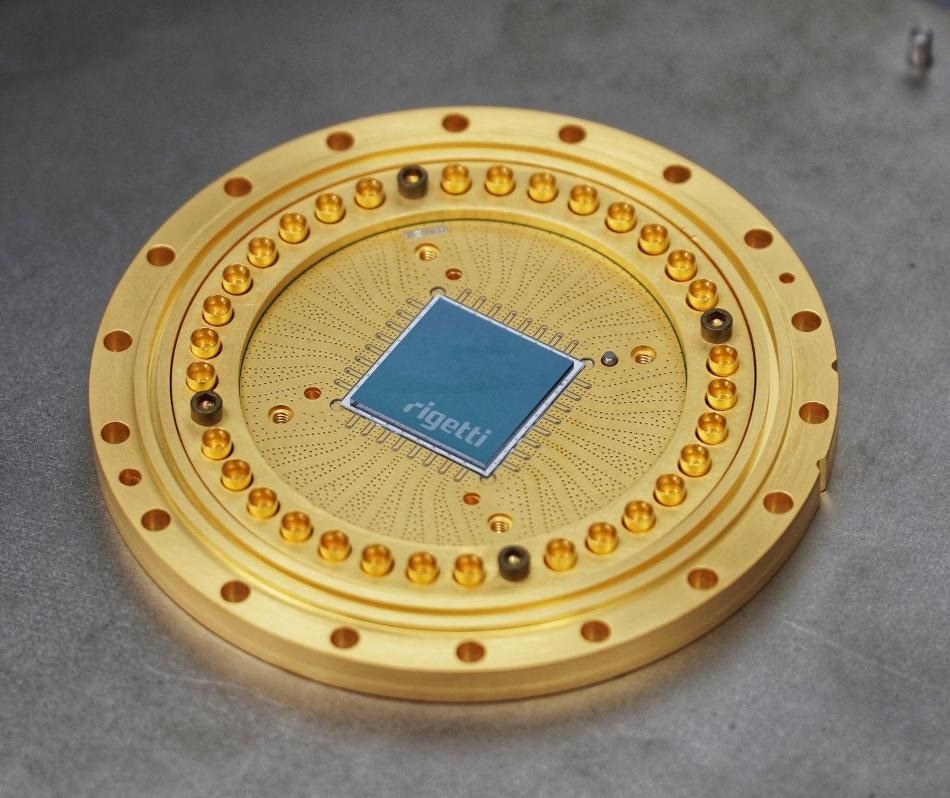Feb 5 2018
A major barrier to expanding quantum computing machines is "qubit interference." In recent research published in Science Advances magazine, physicists and engineers from Rigetti Computing, report an innovation that can expand the size of practical quantum processors by decreasing interference.
 This is Rigetti's 19Q superconducting quantum processor. (Image credit: Rigetti Computing)
This is Rigetti's 19Q superconducting quantum processor. (Image credit: Rigetti Computing)
Matt Reagor, the paper’s lead author, says: "We've developed a technique that enables us to reduce interference between qubits as we add more and more qubits to a chip, thus retaining the ability to perform logical operations that are independent of the state of a (large) quantum register."
To illustrate the concept, the Rigetti team uses wine glasses as an analogy to qubits:
When a wine glass is clinked, one will hear it ring at its resonant frequency (typically about 400 Hz). Similarly, soundwaves at that frequency will make the same glass vibrate. Different shapes or quantities of liquid in a glass will generate different clinks, i.e. different resonance frequencies. A clinked wine glass will cause identical, adjacent glasses to vibrate. Glasses that are diverse shapes are "off-resonant glasses," which means they will not vibrate much at all.
So, what's the relation between qubits and glasses?
Reagor explains that each physical qubit on a superconducting quantum processor stores energy as an oscillating electric current. "Think of each qubit as a wine glass," he says. "The logical state of a qubit (e.g. "0" or "1") is encoded by the state of its corresponding electric currents. In our analogy, this is equivalent to whether or not a wine glass is vibrating."
A very successful class of entangling gates for superconducting qubits work by tweaking two or more qubits into resonance with each other. At this tweaking point, the "wine glasses" pick up on one another's "vibrations."
This effect can be powerful enough to create important, conditional vibration alterations that can be leveraged as conditional logic. Imagine siphoning off or pouring wine from one of the glasses to make this tuning occur. With qubits, there are tunable circuit elements that accomplish the same purpose.
"As we scale up quantum processors, there are more and more wine glasses to manage when executing a specific conditional logic gate," says Reagor. "Imagine lining up a handful of identical glasses with increasing amounts of wine. Now we want to tune one glass into resonance with another, without disturbing any of the other glasses. To do that, you could try to equalize the wine levels of the glasses. But that transfer needs to be instantaneous to not shake the rest of the glasses along the way. Let's say one glass has a resonance at one frequency (call it 400 Hz) while another, nearby glass has a different one (e.g. 380 Hz). Now, we make use of a somewhat subtle musical effect. We are actually going to fill and deplete one of the glasses repeatedly."
He continues: "We repeat that filling operation at the difference frequency between the glasses (here, 20 times per second, or 20 Hz). By doing so, we create a beat-note for this glass that is exactly resonant with the other. Physicists sometimes call this a parametric process. Our beat-note is "pure" -- it does not have frequency content that interferes with the other glasses. That's what we have demonstrated in our recent work, where we navigated a complex eight-qubit processor with parametric two-qubit gates."
Reagor concludes: "While this analogy may sound somewhat fanciful, it's mapping onto our specific technology, from a mathematical standpoint, is surprisingly accurate."